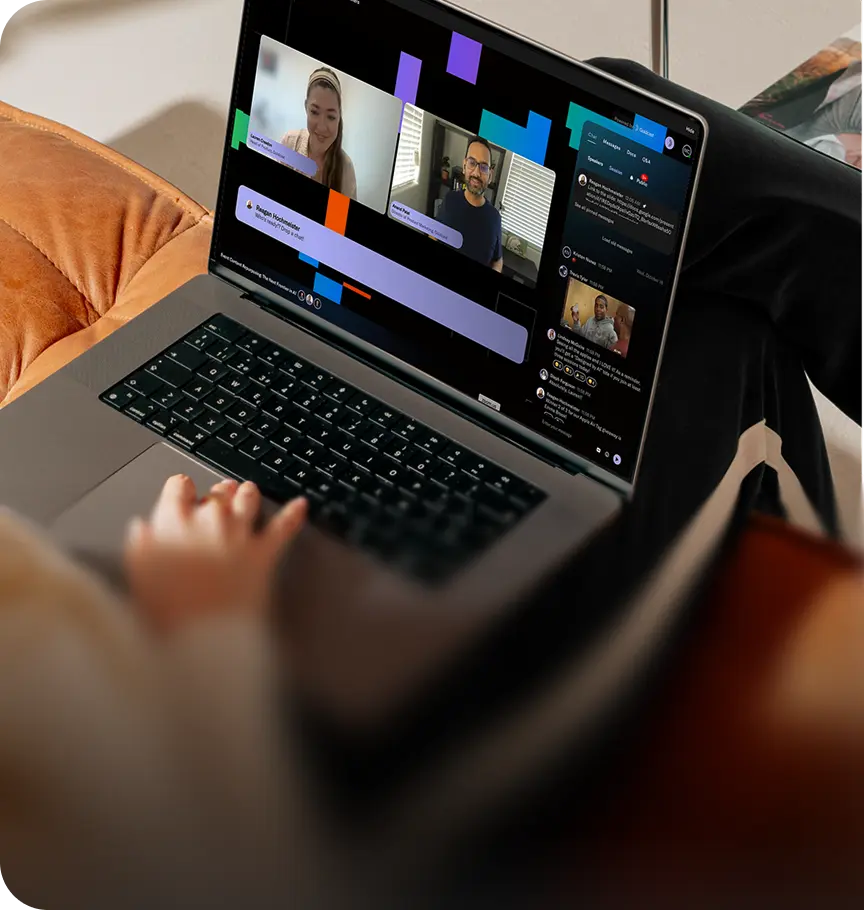Naming an Event: How to Develop Creative Event Titles that Convert
Maximize Your Marketing ROI
Join 10,000 other marketers already getting the best tips on running engaging events that boost pipeline and create raving fans.
If you're drawing a blank when it comes to the perfect name for your virtual event, you're in the right place!
Coming up with a great name that is creative and also conveys the message of your webinar can feel like a tall order. And yet, because it's often your audience's first point of contact with the event, a lot rides on the name, which means you'll need to put the work in to get the job done.
Whether you're naming a one-off webinar, an event series, or a big conference, the title will hook people's initial interest and, when done right, hold it all the way till you close the deal. Today, we'll walk through the art of developing creative virtual event titles that not only grab attention, but also convert your audience into active brand loyalists!
Read on for these event naming tips:
- Consider your keyword strategy
- Do your competitive research
- Assess your audience
- Review your own past results
- Dive into studies and examples
- Brainstorm with your team
- Use AI to spark new ideas
- Put your best event title forward for strong, high-converting events
Consider your keyword strategy
Doubtful that your event can have SEO value? Think again!
When ideating titles, keywords can be a strong informant of your naming strategy. If you're not an SEO expert, partner with an SEO agency, colleague, or content marketer who understands how to use SEO tools to identify important and valuable keywords. Then, use those keywords as you're coming up with ideas.
Here are a few SEO tools that you can play around with to start:
- Keywords Everywhere: a browser add-on that shows search volume and other data
- Ahrefs: free keyword generator option
- SEMrush: free account allows you to search and track keywords
- AnswerThePublic: free search listening tool
Google AdWords Keyword Planner is another tool that can help you gain insight into which keywords people search for when looking for events like yours. This can help you find the ones you want to hone in on as you're naming.
Thoughts from an event marketer
Sometimes something simple and clear is good, too!” says Joel Primack, Community Consultant. “For my community consulting client that hosts monthly IRL dinners, ours follow this naming structure: [Community Name] Dinner - [Month]. Super clear and understandable, as well as clear on the calendar invite that’s automatically sent to them once they RSVP.”
Do your competitive research
Want to convert more people into registrants? Well, to do that, your event has to stand out against the pack. There's a lot of competition out there—but that also means there are a lot of examples for you to analyze!
To start, take a look at what event titles your direct competitors are using. You'll want to be sure that your titles are different enough to register with people. This doesn't mean go wayyyy out there and use a title that doesn't make sense at all for your industry, but if everyone's calling their event "The Basics of Data Analysis," what about naming yours "5 Things Your Data Analysis Might Be Missing"?
On the flip side, if you know there's a competitor event that does particularly well, maybe you can study the title to understand why it's resonating with people and then try to replicate that magic yourself—with your own flavor and brand style, of course. No direct copying allowed!
💡Want inspiration?
Check out our upcoming events section to get a wide variety of event title examples across multiple industries and audiences.

Assess your audience
Sometimes, the answer you're looking for is right in front of you. Look to your audience to find out what they want from your event! Find out what types of events they're attending, what value they're looking to get out of events, and what their interests are.
Here are some ways to research what resonates with your target audience:
- Review their social posts to find out what they're talking/asking about
- Have your sales team ask prospects and customers during sales calls
- Follow social media industry trends to stay on top of new topics
- Track Google trends over time
- Conduct an audience poll to get more direct information
- Send out a survey for feedback after events
It might seem hard to get info from your audience, but people are usually more than happy to help. After all, the better you understand them, the better your event offerings will be for them. It doesn't hurt to ask!
Thoughts from an event marketer
I think about who we're trying to target with the event and what they can expect to get out of it,” says Maureen Mierke at Questline Digital “And then I also look at it from their perspective: If I was in their shoes, would this topic resonate with me? Would it interest me? Make me curious? Sometimes the titles are straight to the point and serious. Other times they're more playful; it just depends on the topic.”
Review your own past results
Your existing event data archive is a treasure trove of info about what works for your audience. Comb through the data from past events to see if you can pull out any common threads among high-performing events.
You can also look back through your social media platform history to see which events got the most engagement. For example, if you usually get 10 likes and two comments but one particular event received double that, it might be a sign that that event's title, topic, or description really hit home for your audience!
Dive into studies and examples
While there's some research you'll have to do on your own, you can also rely on existing studies and examples—like the ones in our very own Attendee Sentiment Report!
If you've already caught up on this report, you know that through our research, we learned that webinars and events that don't use the word "webinar" in the title tend to perform better. That's a tip that may seem counterintuitive but, once you've learned it, will probably stick with you forever.
A quick Google search reveals many other resources, including this HubSpot guide to the catchiest webinar titles and a blog post on how to write solid webinar titles.

Brainstorm with your team
You've probably got a lot of ideas from the research you've done so far. Sometimes nothing helps more than bouncing those ideas off of others and hearing what they've come up with!
Puns, alliterative titles, and rhymes are great brainstorming options. As titles, these can work well to draw audience attention. For example, our upcoming series, Donuts & Demand, plays on alliteration to create an interesting cadence and draw people's eyes to the event. It's easy to see what the event is about (getting demand gen marketers together for a treat of an event!).

If you're feeling stuck during a brainstorming session, try a thesaurus or an online synonym finder. These can help you identify word options you've overlooked or wouldn't have thought of on your own.
Thoughts from an event marketer
“I'm always learning from the people I work with, and I want to share a method I learned about that I refer to as the 'James Rutter brainstorm.' I've used this now quite a few times, and it's one of the most effective approaches I've seen for a meaningful discussion because it allows individual contributions as well as collaboration,” says Melanie Reid, Event Marketing Manager at Riskified.
“Here are the steps once you've established what idea/concept you want to talk about, and the desired outcome of the brainstorm:
- After re-establishing the objective, everyone goes cameras off to do an independent brainstorm for 5 minutes...there's something great about impulse ideation. Any and all ideas get listed in one document.
- Cameras come back on, and everyone reviews each other's ideas together. The group collectively discusses and selects their favorites; this is also an opportunity to combine a few different ideas into one greater one!
- Recognize this was a brainstorm - look at all of the ideas you came up with that you can repurpose in the future.
- Move forward with your decisions, and confirm next steps.
I know it seems simple, but you'll see more streamlined decision making once implemented!”
Use AI to spark new ideas
You can also brainstorm with the help of AI tools, which—unlike creative teams—never get tired of generating ideas!
We recommend using AI tools as more of a supplement to your naming process; it's more likely to give you a name that will spark an idea for you, versus delivering a polished final product you can use immediately.
For example, for this blog post, an AI tool suggested these titles:
- Virtual Event Alchemy: Transforming Words into Memorable Online Experiences
- Unveiling Virtual Event Names That Tell Stories and Build Connections
- Virtual Event Nomenclature: How to Choose Names That Resonate and Engage
While none of these felt like the right fit, they did get our wheels turning as to the main point of this post—which is to develop high-converting event titles—and the best way to lay that out in the title. If you're just starting out with AI, some tools to try are: Jasper, ChatGPT, and Notion AI.
Thoughts from an event marketer
Honestly, I’ve been loving ChatGPT,” says Isabelle Ballard at Marq. “I write the description for the event and come up with 10 options based on that. I can ask it to make them wittier or more serious. As a solo event manager on my team, it saves a ton of time. I usually end up tweaking them a lot, but it gives me a great jumping off point!”
Put your best event title forward for strong, high-converting events
While event success doesn't rely entirely on the title, it does make a huge impact. It's the first thing a person sees about your event and probably gives them a strong hunch as to whether or not they're going to be interested in the content. It's worth putting in the effort to come up with a strong, creative title!
Using these tips above can help you move forward with confidence as you name your virtual events and produce event names that draw in the right audience. Over time, you'll become a natural at crafting strong, conversion-worthy titles every single time!
If you're looking for more event marketing resources, check out our new-and-improved Event Marketing 3.0 Playbook! You'll learn about the new frontier of virtual events, as well as what the future holds.

Transform Your Video Marketing with AI
Stay In Touch
Platform
Resources
© 2026 Copyright Goldcast, Inc. All rights reserved.
YOUR PRIVACY CHOICES




 Upcoming Events
Upcoming Events Event Series
Event Series On-Demand Events
On-Demand Events

